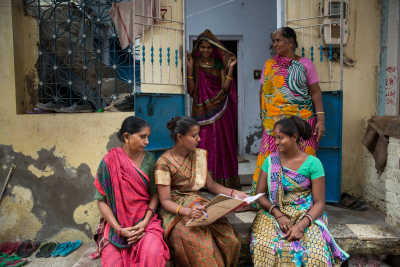
By Anya Stern, Jake Grout-Smith and Maria Hughes
In early 2018 Comic Relief launched a new strategy, which included a new commitment to Gender Justice as one of our core areas of focus. We know that structural disempowerment needs structural solutions. So we wanted to fund work towards long-term systemic change for women and girls, and to support women-led movements to do it. But we were also acutely aware that without real thought and care, funders can do more harm than good in supporting movement-related work – the requirements and demands of typical, project-based mainstream funding can undermine the very nature of what movement-related work is – unpredictable, longer-term and prioritising the ‘how’ work gets done as well as what the aims are.
Building on many ongoing conversations with feminist funders and organisations, we commissioned a piece of scoping(opens in new window) to look at the roles and approaches that funders might take in supporting movement-related work (accessible from our Reports and Publications webpage).
As with Comic Relief’s whole Gender Justice strategy, Power Up prioritised women and girls having the power to identify their needs, organise around solutions and strategies, and collectively make decisions on how to move forward. We had over 700 proposals from around the world, and ended up funding 17 of these(opens in new window). The focus, breadth, context and lived experience of the women and girls we’re working with could not be more varied – from pioneering women working to protect their land and environment from destructive mining interests, to informal workers in Sub Saharan Africa learning from their peers in South Asia about building effective mechanisms to secure reasonable pay and work standards; from refugee and asylum-seeking women in the UK building advocacy platforms, to a movement of women’s centres collaborating to transform the over-use of custody for non-violent female offenders. But what they all have in common, are the systemic oppressions and norms that mean they are minoritized in their communities, and wilfully excluded from decision making about their bodies, their lives, their communities and our societies.
The funding is being utilised to meet both immediate needs, and long-term strategies – from core funding to direct delivery, rapid response funds to building grassroots mass support. Groups have pushed beyond the narrow confines of projects to place this funding within the context of their wider and longer-term mission. This is reflected in the programme’s monitoring, evaluation and learning (MEL) approach. MEL is still a critical focus to contribute to the evidence on the importance of social movements in tackling structural disempowerment. However, the usual outcome frameworks undermine the fluidity, unpredictability and longer-term processes of change that is at the core of movement work. The focus in Power Up is instead on the elements of strong movements (leadership and power, constituency, collective agenda setting, capacities and collaborations); having the mechanisms in place to be able to capture change when it happens rather than trying to predict it; to think about what success with this funding might look like in the context of contributing to movement work and that longer-term vision; and regularly adjusting this in the light of changing circumstances.
We also understood early on that the learning focus shouldn’t just be constrained to individual groups and partnerships; that building in mechanisms for groups and activists and colleagues to learn from the work each other is doing could be of enormous benefit. So we commissioned a Learning Coordinator (Barbara Klugman(opens in new window)) to work with all the groups in creating a space and process for learning, solidarity and support across the programme, as well as helping us at Comic Relief to think through and reflect on how we navigate our role, demonstrate responsible funding practice and show the importance of supporting this kind of work to other funders.
Adaptability to meet the collective interests and needs of the groups is at centre of the Learning Coordinator role. But whether this collective space went beyond solidarity and information sharing across such a varied cohort, was something that we knew we would have to wait and find out. Given the situation the world has found itself in with the impact of the global pandemic; what was already some of our most flexible funding and the most focussed on transformational change and learning, has been put to the test. In our next blogs, Barbara and her team will reflect on the collective process to date, as well as some of the useful resources that have resulted from this.
If you would like to know more please contact Anya Stern (a.stern@comicrelief.com(opens in new window)) or Maria Hughes (m.hughes@comicrelief.com(opens in new window))
Photo Credit: Paula Bronstein/Getty Images Reportage - Ahmedabad, India: Neighbourhood women gather outside their homes to discuss the area upkeep and work issues. As organized home-based workers, the women associated with the Self Employed Women's Association (SEWA), a trade union that works to secure the rights of workers in the informal sector, and Mahila Housing Trust (MHT), a NGO that improves the housing conditions of poor, informally employed women, have led slum upgradation programmes in their area and also received training on working from home and how to market their products.


